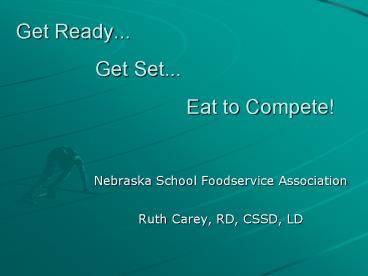Get Ready... Get Set... Eat to Compete - PowerPoint PPT Presentation
1 / 29
Title:
Get Ready... Get Set... Eat to Compete
Description:
Types of Carbohydrate best for Recovery. high glycemic index. sucrose. potatoes. white bread ... Causes low blood sugar if taken before exercise, resulting in fatigue ... – PowerPoint PPT presentation
Number of Views:153
Avg rating:3.0/5.0
Title: Get Ready... Get Set... Eat to Compete
1
Get Ready... Get Set... Eat
to Compete!
- Nebraska School Foodservice Association
- Ruth Carey, RD, CSSD, LD
2
Objectives
- Healthy Eating
- Calorie Distribution
- Food Guide Pyramid
- Macronutients
- Functions
- Role in Performance
- Food Sources
- Hydration
- Supplements
3
Importance of Good Nutrition
- Physical Energy
- Proper Growth
- Maintain Health
- Prevent Injury
- Speed Recovery
- Good Brain function
- Optimal Body Composition
4
Fuels for the Body
- 55-60 carbohydrate
- 12-15 protein
- 25-30 fat
5
Food Guide Pyramid
6
CARBOHYDRATES
- Major fuel for muscle work
- Stored in muscle and liver as glycogen
- Important for exercise
- Short term, high intensity
- Long distance endurance
60-70 Carbohydrates
7
High Carbohydrate foods
- grains and starches
- fruits and vegetables
- milk, soy milk
- sports drinks and jels
- desserts
8
Effects of Inadequate Carbohydrates in the Diet
- Lack of energy
- Muscle fatigue
- Muscle Breakdown
- Confusion
- Lack of concentration
9
Types of Carbohydrate best for Recovery
- high glycemic index
- sucrose
- potatoes
- white bread
10
Sugars CAUTION
- Causes low blood sugar if taken before exercise,
resulting in fatigue - Slows down the emptying of fluids from the
stomach and may cause cramping - Deprives muscles of much needed water
- Inhibits fat utilization
11
Carbohydrate Intake Helps Sprint Performance
- Participants were able to perform more sprints
(22 vs 15) when hydrating with a carbohydrate
rich sports drink than with plain water - Jackson et al, MSSE, 27S 223, 1995
12
Summary on Carbohydrates
- Performance and training in all sports will
benefit from a high carbohydrate diet - Intake of carbohydrates during stop-and-go sports
will maintain fuel stores and performance - Eating carbohydrates right after practice will
speed recovery
13
PROTEIN
- Do athletes have greater protein needs than
non-athletes? YES. - Should athletes eat more protein to meet their
needs? NO.
14
PROTEIN
- Used to build and repair muscle tissue
- Inefficient energy source
- Contributes energy for exercise lasting longer
than four hours - High protein diets DO NOT increase muscle size
and are not recommended
12-15 Protein
15
Protein Food Sources
- Meat, poultry, fish
- Egg whites
- Milk/cheese
- Dried beans
- Nuts and nut butters
16
Meeting Daily Protein Requirements
17
FAT
- Large potential energy source
- Major energy source
- Aerobic, low intensity, exercise
- Exercise of long duration
- Dietary excesses are stored in the body as
adipose tissue
20-30 Fat
18
Fat Food Sources
- Fried foods
- Margarine, butter, oils
- Salad dressings and toppings
- Desserts and pastries
- Nuts and seeds
19
WATER
- Needs are increased before, during and after
exercise - Temperature regulation
- Electrolyte balance
- Sodium and potassium
- Thirst is not a sufficient indicator of fluid
needs
20
Tips for Fluid Replacement
- Follow a hydration schedule
- Prehydrate
- Use cool, flavored drinks
- Drinks containing
- Carbohydrate improve performance
- Sodium helps with rapid rehydration
- Avoid carbonation, caffeine and alcohol
- Med Sci Sports Exec 28(1) i-vii, 1996
21
More Tips for Fluid Replacement
- Drink until 'full', then drink 4-8 more gulps
- Weigh in before and after exercise to ensure
proper fluid replacement - Use personal squeeze bottles
- Monitor urine color and volume
22
Guidelines Adapted from American College of
Sports Medicine
- BEFORE EXERCISE (2 hours prior)
- Consume 16 oz of fluid
- DURING EXERCISE
- Consume 5-10 oz every 15-20 minutes
- AFTER EXERCISE
- Consume 24 oz/pound of lost weight
- Replace 80 of weight lost before next
practice/training session - Sports drink are recommended for exercise
- lasting 60 minutes
- Med Sci Sports Exec 28(1) i-vii, 1996
23
Vitamins Minerals
24
Do Athletes Need Antioxidant Supplements?
- No direct benefit on performance
- Antioxidants, minerals and vitamins are needed
for maintenace of overall health - Multivitamin and multimineral supplements
providing 100 RDA are okay - Best approach eat a variety of fruits,
vegetables and grains
25
Goals for Pre-Exercise Meal
- Timing 2-3 hours prior
- High in complex carbohydrates
- Low in simple sugars
- Easily digestible
- Low fat and moderate protein
- Sufficient calories to prevent hunger
- Adequate fluid
26
Goals for Post-Exercise Meal
- Eat within 30-60 minutes after exercise
- Include source of carbohydrate
- Sucrose
- Potatoes
- Sports Drinks
- Include source of protein
- Consume 150 of weight lost during exercise
27
Summary
- Performance and training in all sports will
benefit from a high carbohydrate diet - Fluid needs are increased before, during and
after exercise - To ensure adequate vitamins and minerals, eat a
variety of fruits, vegetables and grains - Think real food first
28
- QUESTIONS?
29
Thanks National Cattlemens Beef Association and
Nebraska Cattlemen































